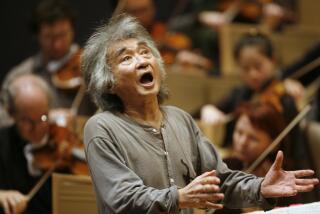Isao Okawa; Helped Sega Become Video Game Giant
- Share via
TOKYO — Isao Okawa, president and chairman of Sega Corp., the third-biggest video game maker, died Friday of heart failure in a Tokyo hospital, Sega and its largest shareholder, CSK Corp., said in a statement. Okawa was 74.
Okawa, also the founder and honorary chairman of CSK, a computer service provider, had been Sega’s chairman since April 1984 and took on the added role of president last June. He also was chairman of Ascii Corp., Bellsystem 24 Inc., CSK Electronics Corp. and Nextcom KK. Analysts didn’t expect the chairman’s death to have any near-term effect on Sega.
Okawa, who had been suffering from cancer, was not running the company at the time of his death, deferring to an executive committee.
Takashi Oya, a senior analyst at Deutsche Securities Ltd. in Tokyo, said: “No immediate negative impact on Sega from this news is expected, as he added charisma to the company but did not have sole management power. He did everything he could for Sega before he left.”
One of Japan’s largest taxpayers, Okawa demonstrated a personal commitment to Sega. In the last year he was the primary source of financial support for the Tokyo-based company. Last month he gave $691.6 million, mostly in shares of Sega and other CSK group companies, to bail out the company, which expects to post a fourth consecutive annual loss for the year ending this month.
Born in Osaka, western Japan, in 1926, Okawa graduated from Waseda University. He formed Computer Service, which became CSK, in 1968. Okawa was granted several honors by the government for his efforts to aid and revitalize Japanese high-technology companies. He received an honorary doctorate from his alma mater.
In 1998 he donated $27 million to the Massachusetts Institute of Technology for a new center devoted to studying the effects of digital technologies on children. The gift was the largest in MIT’s history and was believed to be the largest such gift by a Japanese individual to a foreign institution.
Okawa guided Sega into the home video game market with the Genesis console in 1986, a year after Nintendo found success in arcade-style games. In 1989 Sega introduced the Sega Genesis, which was twice as fast as its original machine and became a top seller in the United States.
Its newest game platform, Dreamcast, failed to catch on, in part because Sega lacked the marketing muscle of its chief rivals, Sony and Nintendo. In January, the company, known for popular games such as Sonic the Hedgehog, announced it was scrapping Dreamcast and would concentrate on making game software.






